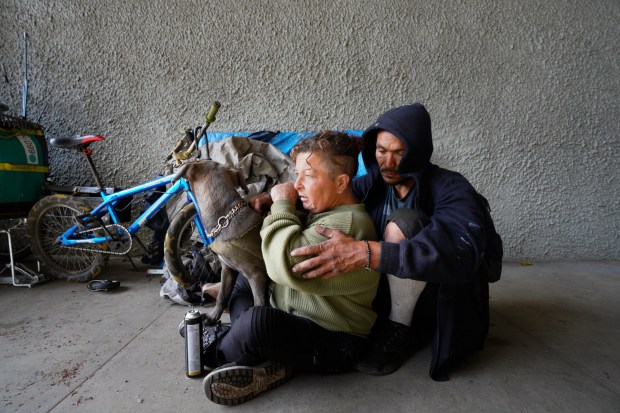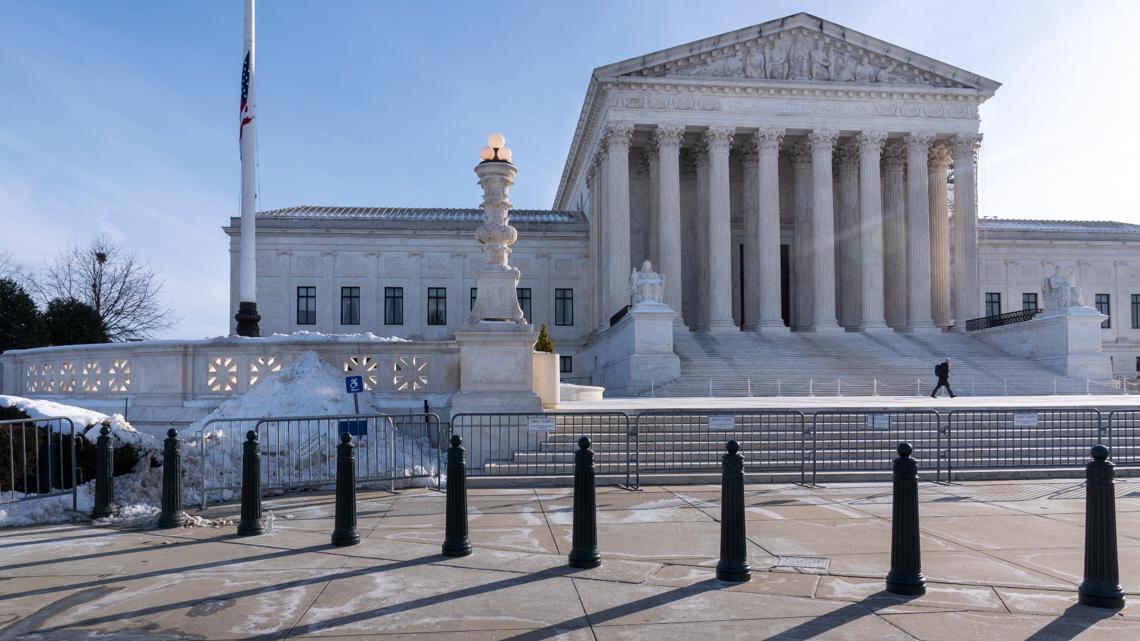
On a Tuesday morning in April, a pair of San Diego police officers walked toward the downtown public library. Ahead of them was a bearded man who looked like he’d spent the night outside.
“Good morning,” one officer said.
“I’m moving,” the man responded.
San Diego’s camping ban, along with similar laws that discourage sleeping on sidewalks, loom large in the public consciousness. Elected leaders cite the measure as a key tool for reducing encampments and vast networks of tents are no longer covering whole downtown blocks.
Yet that doesn’t mean many homeless residents are actually ending up in court.
Since the City Council passed the Unsafe Camping Ordinance almost two years ago, police have used the law to ticket and arrest people 325 times, according to department data obtained through a records request. However, a spokesperson for the San Diego City Attorney said their office had agreed to prosecute only 14 of those cases, representing about 4% of the total. Even if another 26 cases still under review at the start of last month are eventually taken up, the resulting prosecution rate would nonetheless hover around 12%.
“That is unbelievably low,” Capt. Steve Shebloski, head of San Diego’s Neighborhood Policing Division, said in an interview. “We have to do a better job.”
The police data — which stretch from summer 2023, when enforcement began, through April of this year — illustrate the complexities of enforcing laws that target a vulnerable population. And that population is here for the foreseeable future: While one recent tally found that homelessness countywide had dropped for the first time in years, a separate method for quantifying the crisis continues to show that more residents lose their homes each month than the number of homeless people who get housing.
The police captain attributed the low prosecution rate to multiple factors. For one, there was sometimes a legal gray area as to how many personal belongings constituted an encampment, he said. Plus, the absence of a camping ban charge didn’t always mean there was no case. The first person arrested under the law, for example, didn’t go to trial for sleeping outside but faced a felony for allegedly selling methamphetamine.
The department has increased its training, partially to ensure that officers more clearly document instances when individuals on the street are offered, but refuse, shelter beds. (The ordinance sometimes only takes effect when beds are available.)
Regardless, Shebloski believes the ban can push subsets of the homeless population, particularly those struggling with addiction, into treatment, and he worries that a lack of prosecutions effectively waters down the law. “If people just get a ticket and know it’s never going to be issued, they just crumple it up and throw it away,” he added. “When cases don’t get issued, there’s no leverage point for our most chronic and difficult folks to get help.”
Officials with the City Attorney’s Office have said they want to tread carefully. “It’s not as easy as it seems when you’re trying to prove cases like this, when it’s a brand-new law,” former City Attorney Mara Elliott said last year. Resources are limited. Jurors want clear evidence. Botched prosecutions might even set the stage for the law itself to be challenged in court.
The work can certainly take time. In one of the first camping ban prosecutions, a deputy city attorney wrote in court records that they’d not only read the officer’s report but “reviewed relevant body worn camera footage, surveillance, and audio recordings.”
The current prosecution rate actually appears to be higher than what it was during the initial months of enforcement. At the time, experts partially attributed the low numbers to the legal uncertainty surrounding many homelessness-related laws. While the U.S. Supreme Court did end up giving cities more leeway to clear encampmentsother settlements and ordinances offer homeless residents in San Diego more protection than they might receive elsewhere.
Even when a camping ban case is prosecuted, jail time is unlikely. Of the 11 cases that had gotten a hearing as of last month, 7 defendants didn’t show up, according to City Attorney spokesperson Ibrahim Ahmed. The other four individuals had either finished — or were still working through — diversion programs, which allow the cases to be dismissed.
Shebloski said police leadership had been meeting with the City Attorney’s Office and the prosecution rate had increased in recent months.
“As prosecutors, we bring forward those cases that can be proven beyond a reasonable doubt,” Ahmed, the City Attorney’s Office spokesperson, said in a statement. “When enforcing the unsafe camping ordinance, the police may have probable cause to arrest someone for violating the law, but this same evidence and investigation may not support the filing of criminal charges.”

Other laws can also be used to dismantle tent camps.
Since summer 2023, San Diego police have used the city’s encroachment ordinance, which prohibits blocking public areas, to cite and arrest people nearly 2,200 times. Yet the prosecution rate is similarly low: The City Attorney’s Office had taken up only 102 cases as of early May, which is about 4% of the total. Another 52 incidents were still under review.
The agency’s apparent reluctance to file charges may additionally be influenced by a mixed record in court. Among the 80-plus encroachment hearings that had been held as of early last month, the people charged didn’t show up 65 times. Several other individuals agreed to participate in diversion programs, and 20 cases were ultimately dismissed.
Many advocates for homeless people argue that the encroachment law and camping ban end up criminalizing poverty, especially because the region’s shelter system has nowhere near enough space for everybody asking for beds.
The San Diego Police Department did in recent months double the number of homeless outreach officers patrolling the streets. Even the teams enforcing the camping ban generally first offer services to those they encounter.
The police officers by the downtown library in April asked the bearded man if he was interested in shelter. He was. One officer, Allie Cimmarrusti, handed the man her business card while her partner, Marcus Files, pulled an iPhone out of his breast pocket to take notes.
“Do you have a preference for a bottom or a top bunk,” Files asked.








